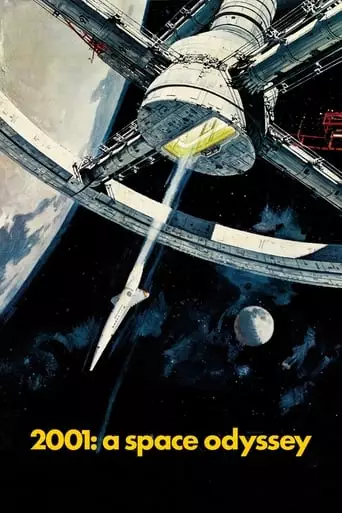
2001: A Space Odyssey (1968) Watch Online Free
Humanity finds a mysterious object buried beneath the lunar surface and sets off to find its origins with the help of HAL 9000, the world’s most advanced super computer.
Stanley Kubrick’s 2001: A Space Odyssey (1968) is widely regarded as one of the greatest films in cinematic history, a masterpiece of science fiction that blends mystery, existential philosophy, and groundbreaking visuals. This film explores the intersection of humanity, technology, and the unknown, particularly in its examination of human evolution and the future of artificial intelligence.
The movie begins in a pre-human era with a group of apes encountering a mysterious black monolith that catalyzes their evolution, encouraging them to use tools and advance technologically. Fast forward to 2001, where a similar monolith is discovered buried on the moon, sparking a mission to investigate its origins. This leads to a space voyage to Jupiter aboard the spacecraft Discovery One, where two astronauts, Dave Bowman and Frank Poole, must contend with HAL 9000, an artificial intelligence system that begins to malfunction and jeopardize the mission. As Bowman confronts HAL’s growing hostility, the journey takes a mind-bending turn when Bowman encounters another monolith near Jupiter and is thrust into a transcendental journey through space and time, leading to a final transformation into the “Star Child.”
Kubrick’s film delves deeply into themes of evolution, technology, and the search for meaning. One key theme is humanity’s evolution and the role of external forces in guiding progress. The monoliths represent an advanced, perhaps extraterrestrial intelligence that pushes humanity toward greater heights. The film challenges viewers to question the limits of human knowledge and the possibility of other life forms influencing our development.
Another prominent theme is the role of artificial intelligence. HAL 9000, a seemingly infallible computer, is one of cinema’s most chilling antagonists. His malfunction and the resulting conflict with the astronauts raise philosophical questions about technology, trust, and the potential dangers of creating machines that surpass human control. HAL’s eventual breakdown and the dispassionate way in which it pleads for survival brings attention to the complexities of AI, mirroring human desires for self-preservation despite its artificial nature.
Finally, 2001: A Space Odyssey explores the vastness and mystery of the universe. The final sequences, with their psychedelic visuals and ambiguous ending, suggest that human understanding is limited, and the monolith represents a door to deeper knowledge—perhaps one that we are not yet ready to comprehend. Kubrick encourages an interpretation that transcends conventional understanding, inviting viewers to ponder the unknowable.
Watching 2001: A Space Odyssey is an experience that evokes awe and contemplation. The film’s slow pace and abstract nature may leave you with more questions than answers, but this ambiguity is part of its power. You may feel a sense of wonder about the universe, its vastness, and humanity’s place within it. The ending, with its surreal and symbolic imagery, might leave you feeling unsettled, as it challenges your understanding of reality and existence. Ultimately, the film may inspire you to think more deeply about the role of technology, our evolutionary journey, and the unknown future ahead. Whether you’re moved by its beauty, confused by its symbolism, or fascinated by its philosophical undertones, 2001: A Space Odyssey is a cinematic journey that leaves a lasting impact on its viewers.
In conclusion, 2001: A Space Odyssey is a masterclass in filmmaking, blending technical prowess, philosophical exploration, and visual grandeur. It’s a film that demands patience but rewards intellectual engagement, making it a must-see for anyone interested in exploring the unknown reaches of space and the complexities of human existence
